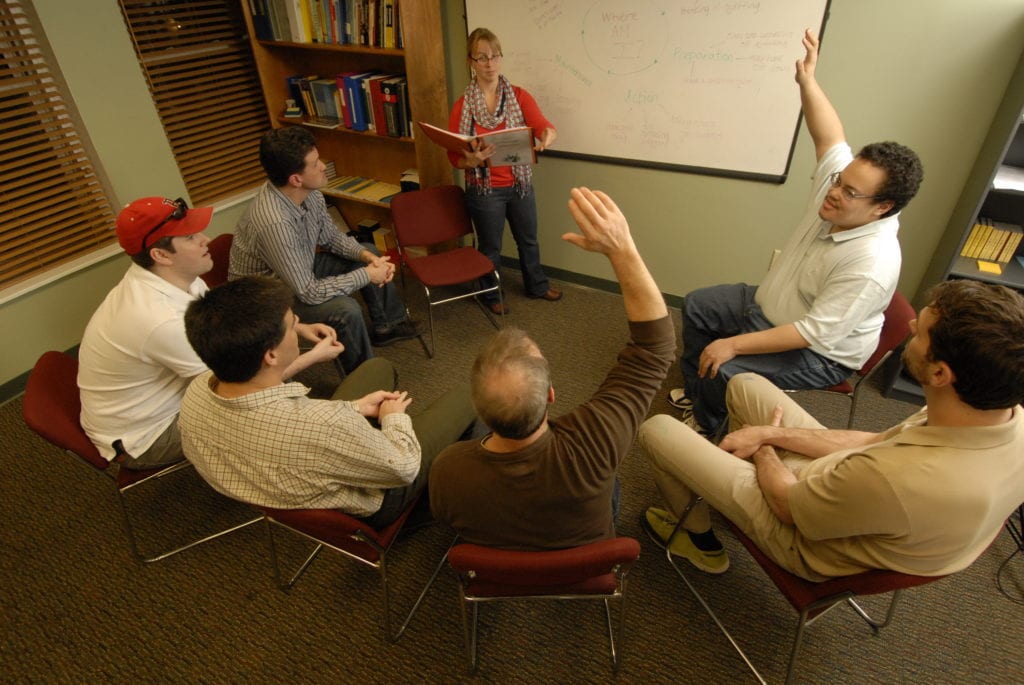WestBridge offers a Men’s Community Integration Program (CIP) based on the evidence-based Assertive Community Treatment (ACT) model for adult men and their families experiencing serious mental illness, with or without co-occurring substance use.
Our intensive Men’s CIP services are part of our flexible and highly successful approach and are:
- Designed specifically for adult men experiencing mental illness with or without co-occurring substance use.
- Modified as needed through an ongoing assessment and treatment planning process.
- Varied in intensity. Men may receive services from two to fifty hours weekly depending on evolving clinical needs.
- Comprehensive, offering complete wrap-around support.
- Accessible 24 hours per day, 7 days per week.
Many men enter our CIP program directly after stabilization in a residential treatment program. Direct-to-CIP admissions are also available to those who qualify. Contact Admissions at 800-634-4446 to discuss your needs.
Men’s CIP Team Members assist participants with:
- Symptom Management
- Substance Use & Mental Health Counseling
- Wellness & Healthy Living Activities
- Holistic Psychiatric Care
- Medical Support & Medication Outreach
- Independent Living Skills – Laundry, Cooking, Home Cleaning, etc.
- Vocational Counseling & Career Development
- Household Financial Management, Budgeting, Housing Maintenance & Stability
- Financial Management
- Mutual Support (Self-Help) Group Identification & Accompaniment
- Family Education & Support
- Smoking Cessation & Sleep Hygiene
- Coordination of Services with Other Providers (PCP, Dentists, Specialists, etc.)
- Relationship Building Skills
- Supported Employment, Education and Volunteering
Our treatment team offers ongoing side-by-side support to build upon recovery skills. While some services are provided in an office setting, CIP team members work with men the majority of the time in their homes, where they work, and in settings in the communities where problems may occur or support is needed. Our CIP team incorporates many elements of the evidence-based Integrated Placement and Support (IPS) model in helping our participants with supported employment, education and/or volunteerism. Our participants are involved in mainstream employment, rather than sheltered workshop settings.
Men Gain Skills to Live, Healthy, and Satisfying Lives
At WestBridge, we recognize the importance of working with adult men and their families to build and sustain skills for successful community living. Family members often carry the burden of providing crisis intervention, support with daily activities, transportation, and other tasks associated with their loved one’s daily routine. Our clinical team works to relieve families of these duties and help them to restore their natural relationships.
While success and recovery are defined by each man and family we work with, some common goals include:
- The ability to have satisfying relationships
- Developing/improving independent living skills and maintaining a healthy environment
- An educational, volunteer and/or or work experience(s) that feels productive and forward-moving
- Medication support and outreach with the goal of medication independence
- Support with community integration
Individual progress is tracked throughout the course of treatment with our Recovery Index. The WestBridge Recovery Index was developed with support from Robert Drake, MD, and is based on assessing the Integrated Dual Disorder Treatment principles. It tracks stages of change, over time, within the following recovery domains: housing, education/employment, friendship, family, mental health, substance use, spirituality, tobacco use, healthy eating, exercise, sleep hygiene, physical health, and personal hygiene. It is completed upon admission, transition and/or quarterly thereafter. View our program outcome reports here.
Our Multidisciplinary Men’s CIP team provides expertly coordinated care
CIP team members provide comprehensive services in a central setting, which provides a high level of communication and coordination of care. Every member of the team is familiar with each participant and his family to assure the timely and continuous provision of services.
The Men’s CIP team members include the following:
- Psychiatry
- Nursing
- Care Management (experience in social work, mental health counseling, addictions counseling)
- Vocational Resource
- Mentors
Team members work with participants in community settings to practice and improve both their recovery skills and independent living skills, including financial management, relationships, housing, recreation, work, school and health care. Services are provided when and where needed.
The Role of Mentors
WestBridge Participants work with Mentors throughout their treatment. These CIP team members, many of whom have achieved long-term recovery themselves, play an integral role and enhance the clinical care program by developing one-on-one partnerships that focus on the needs of each participant.
WestBridge Mentors provide participants with support during evening hours, and for certain independent living skills and activities.
Some of the ways mentors assist participants include, but are not limited to:
- Achieving academic and vocational goals through homework and employment support
- Maintaining a safe home environment through house cleaning and maintenance
- Developing community connections through social engagement and activities
- Developing healthy wellness and nutritional habits through side-by-side grocery shopping, cooking and exercise
- Navigating their environment, including the use of public transportation
- Transportation to and involvement in mutual support/self-help groups
- Medication outreach and symptom monitoring
- Involving the on-call clinician immediately during any crisis and whenever a variance in the planned activities occurs
Mentorship involves a supportive relationship that develops over time between an experienced person and one who is learning. The role modeling and fellowship involved nurtures and supports adult men in a way that is more informal than therapy.
Men’s Respite: Additional Temporary Support
WestBridge reserves respite capacity in our residential program specifically for CIP participants, allowing for short-term stays when additional structure is needed.
- Respite is available, based on capacity, to participants in our CIP program who are experiencing acute mental health symptoms, risk of substance use and/or medical needs requiring additional support and stabilization.
- The residential setting provides a safe and supportive environment to help reduce hospitalizations, relapse, and the potential negative consequences of remaining in the community.
- Respite care is individualized to meet a participant’s presenting needs, with the expectation that they agree to observe the policies of the residential program.
Many men and their families have benefitted greatly from this short-term access to our supportive residential environment.
Admissions
Studies have shown that ACT services are highly effective for people who have frequent episodes of severe symptoms that are either difficult to manage or that never go away, and reduces the number of hospital stays, increasing one’s ability to remain active in their community. We have based our CIP program on this model as a result.
Many men enter our CIP program directly after stabilization in a residential treatment program. Direct-to-CIP admissions are also available to those who qualify.
For questions on our Men’s CIP program, please call our Admissions Team at 800-889-7871. Our team is expertly trained to answer any questions you may have.







